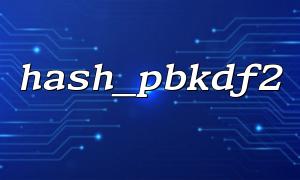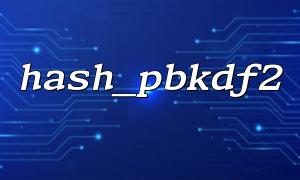hash_pbkdf2 is a utility function in PHP designed to implement PBKDF2 (Password-Based Key Derivation Function), typically used for password storage and verification tasks. Since PHP version 5.5, hash_pbkdf2 has been included as part of the PHP standard library. It generates a key by using a specified hash algorithm and a number of iterations, which is essential for enhancing password security. Although hash_pbkdf2 has been available since PHP 5.5, many developers have questions about its compatibility and performance in PHP 7 and later versions.
The primary role of the hash_pbkdf2 function is to combine a given password with a salt value, then perform multiple hashing iterations to produce a fixed-length encrypted output. The function is defined as follows:
<span><span><span class="hljs-keyword">string</span></span><span> </span><span><span class="hljs-title function_ invoke__">hash_pbkdf2</span></span><span>(</span><span><span class="hljs-keyword">string</span></span><span> </span><span><span class="hljs-variable">$algo</span></span><span>, </span><span><span class="hljs-keyword">string</span></span><span> </span><span><span class="hljs-variable">$password</span></span><span>, </span><span><span class="hljs-keyword">string</span></span><span> </span><span><span class="hljs-variable">$salt</span></span><span>, </span><span><span class="hljs-keyword">int</span></span><span> </span><span><span class="hljs-variable">$iterations</span></span><span>, </span><span><span class="hljs-keyword">int</span></span><span> </span><span><span class="hljs-variable">$length</span></span><span>, </span><span><span class="hljs-keyword">bool</span></span><span> </span><span><span class="hljs-variable">$raw_output</span></span> = </span><span><span class="hljs-literal">false</span></span><span>)
</span></span>The common parameters are explained as follows:
$algo: Specifies the hash algorithm, commonly sha256, sha512, etc.
$password: The original password that needs to be encrypted.
$salt: The salt value added to enhance password security.
$iterations: The number of hash iterations, usually set to a high value (e.g., 1000 or more) to increase the difficulty of cracking.
$length: The length of the returned key.
$raw_output: If set to true, the function returns raw binary data; if false, it returns a hexadecimal encoded string.
Since PHP 5.5, hash_pbkdf2 has been a core PHP function and it was neither removed nor deprecated in PHP 7.x versions. Therefore, it continues to be usable in PHP 7 and higher. For most PHP 7.x or PHP 8.x systems, the hash_pbkdf2 function is fully compatible, and its functionality has remained unchanged.
The hash_pbkdf2 function retains its original features in PHP 7 and above, with no major changes. Its internal implementation has remained mostly consistent, so developers do not need to make any modifications to continue using it. However, there are several points to note:
Although hash_pbkdf2 is part of the PHP standard library, in some cases the PHP environment might not have all hash algorithms enabled. hash_pbkdf2 depends on the underlying hash extension, so it is important to ensure that this extension is enabled in your PHP environment.
PHP has continued to enhance support for hash algorithms in versions 7.x and 8.x. When using hash_pbkdf2, it is recommended to use stronger algorithms like sha256 or sha512, since older algorithms (such as MD5 or SHA-1) have known security vulnerabilities.
While hash_pbkdf2 supports a large number of iterations to improve security, excessive iterations can significantly impact performance. Choosing the right number of iterations is crucial in production environments. PHP 7 and above have performance improvements, especially under high load, but configuration should still be adjusted based on real-world scenarios.
Although hash_pbkdf2 is available and unchanged in PHP 7 and later versions, some recommendations should be followed to ensure better compatibility and security:
For storing passwords and other sensitive information, selecting a suitable hash algorithm is essential. It is recommended to use sha256 or sha512, as they offer a good balance between speed and security.
To enhance password storage security, it is advisable to set a sufficiently high number of iterations (e.g., 10,000 or more). This increases the difficulty of brute-force attacks but may affect performance slightly. Iteration count should be adjusted based on system performance and security needs.
While hash_pbkdf2 can handle PBKDF2, if your application has complex password encryption needs, consider using specialized libraries such as password_hash or libsodium. These libraries generally provide higher security and better usability, with enhancements introduced in PHP 7.2 and later versions.
hash_pbkdf2 remains valid and unchanged in PHP 7 and above. It continues to be a reliable tool for password storage and key derivation. However, developers should choose hash algorithms and iteration counts thoughtfully according to security requirements, and use more advanced encryption libraries when necessary to improve security. For applications involving password management, besides hash_pbkdf2, it is recommended to use password_hash or libsodium available in PHP 7.2 and later, as they offer superior security and ease of use.




